Are you heading out for vacation but worried about leaving your neighborhood birds behind? Not to worry, there are simple steps you can take to ensure your birds are well fed and ready for your return. In this Bird Bites blog post, I’m laying out a few simple tips on how to feed the birds at your home while you’re away on vacation.
Buying a larger bird feeder, experimenting with seed cylinders and suet cakes, as well as investing in a smart bird feeder, are all avenues to explore.
Before jumping in, I find it important to emphasize that your local birds will be just fine if you don’t feed them while you’re out and about. Bird feeders are a supplemental food source. However, birds are habitual and may not immediately return to your feeders if you leave them empty for a week or two. So, the idea here is to keep your birds coming back so you’ll enjoy them when you return home.
Disclaimer: A link found on this page is an Amazon affiliate link. If you click an affiliate link and make a purchase, I might earn a commission. As an Amazon Associate I earn from qualifying purchases. (There’s no extra cost to you if you do this).
Also, I’m well-aware you can hire or recruit someone to feed your birds while you’re away, but I’m writing this article with alternative tips if you don’t have someone readily available, or don’t want to pay someone to do it.
1. Buy a Large Bird Feeder
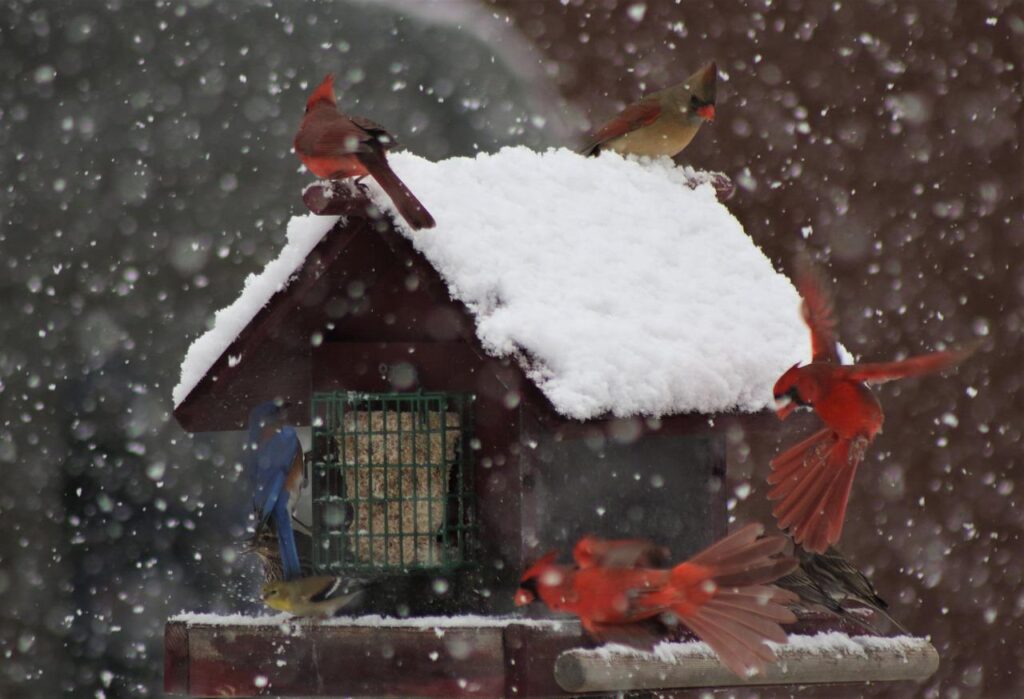
If you spend a lot of time traveling or don’t have a ton of time to refill your feeders, buying a large bird feeder can go a long way.
I’d recommend getting at least one large hopper or tray feeder for your station. Both types will hold a lot of bird seed.
Check out my recent post on some of my favorite bird feeders that I found on Amazon here.
2. Experiment with Seed Cylinders and Suet for Birds
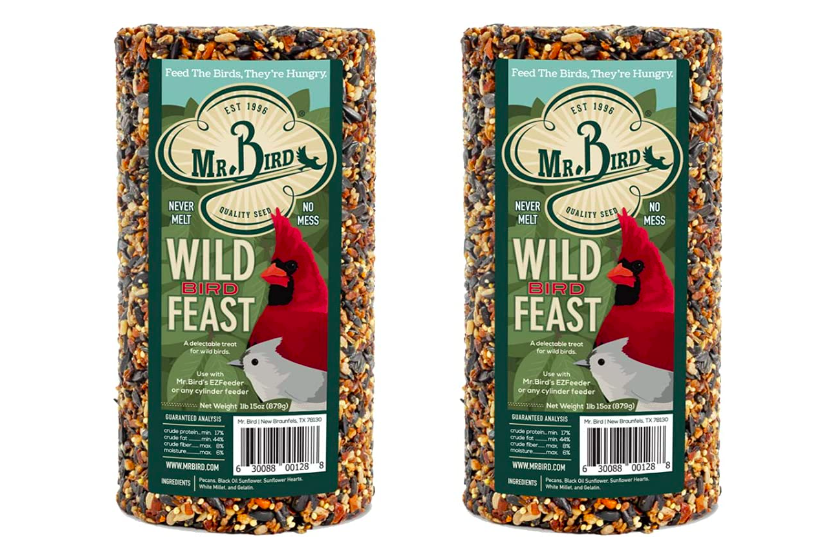
Seed cylinders are basically a bunch of bird seed stuck together in a shape to be stuck onto a pole or cylinder spike feeder. In my experience, they last a long time because birds have to bite and peck the seed off bite by bite. You can also get spicy seed cylinders to slow down squirrels from eating it all.
Suet, like seed cylinders, also tends to last a long time. Buy a larger suet cake feeder and fill it up and you should be set for a couple weeks, or more. A single suet cake can often last me more than a week at my feeding station and only costs $2-$5 per cake. Yes, you can also buy spicy suet (at a slightly higher cost) to help keep rodents away. Here’s my favorite spicy suet cake that I buy right now. It also has bugs in it, which woodpeckers and chickadees go crazy for.
Related Content: My Review of Mr. Bird Flaming Hot Bird Seed – Everything You Need to Know
3. Buy Shelled Bird Seeds
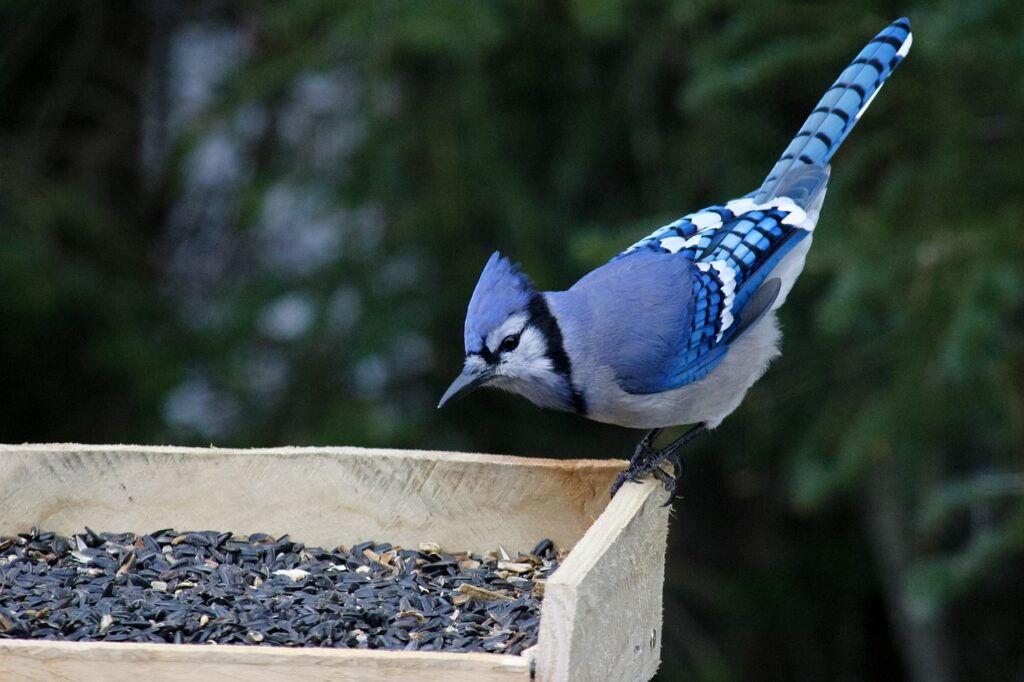
Shelled bird seed like black oil sunflower seed and safflower take longer for birds to eat. So, if you’re traveling, you might want to avoid de-shelled sunflower seed, peanuts and millet as these can all be eaten quickly, especially by squirrels and larger birds like Starlings. Me personally, I like to leave out black oil sunflower seed for the birds before I leave home for an extended period of time. My neighborhood Cardinals, Finches, Sparrows, Chickadees, and Nuthatches all love it and it lasts for a while.
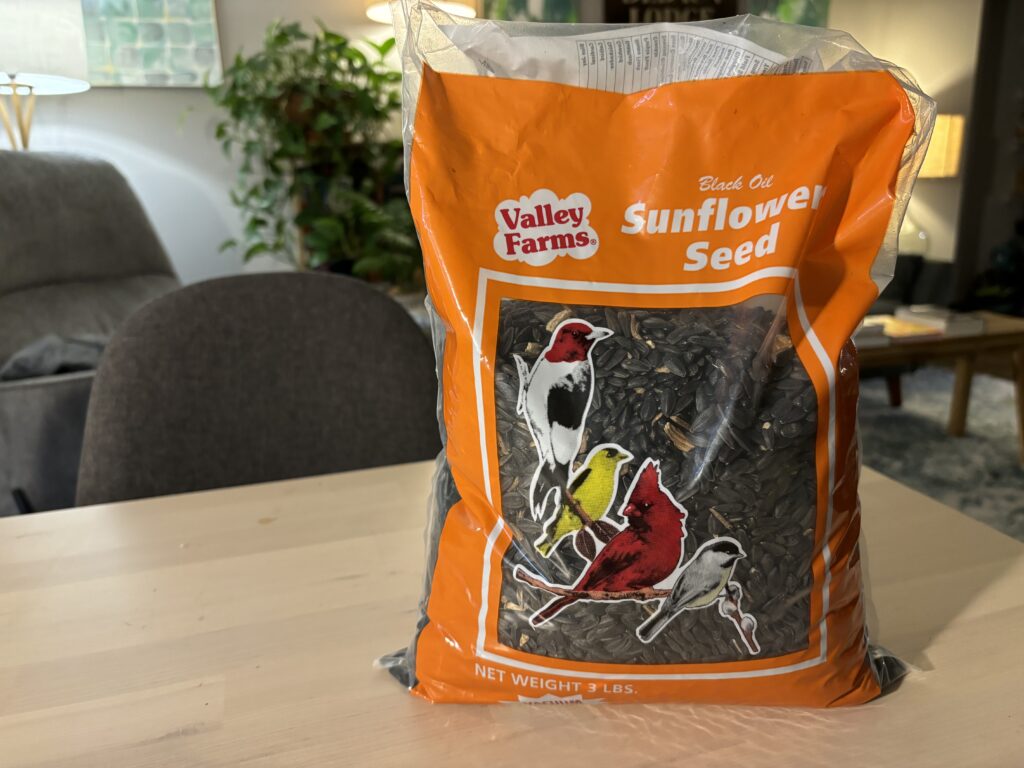
Putting shelled bird seed into a large feeder (and/or a squirrel-proof feeder, see below) should last you for a while.
Related Content: Ranking Bird Seed from Worst to Best
4. Squirrel-Proof Bird Feeders Are Your Friend
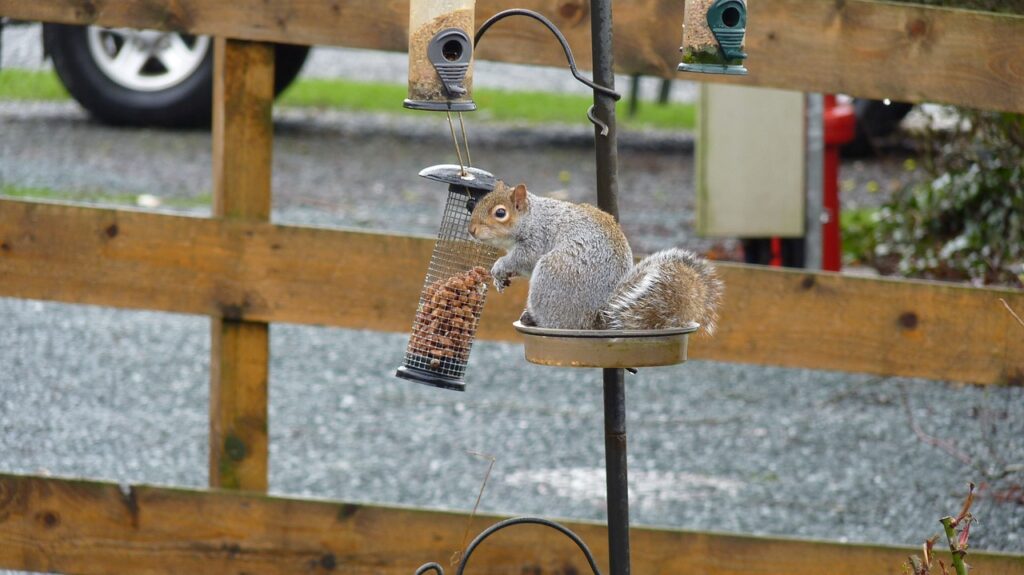
I touched on this earlier, but slowing down squirrels and rodents from eating your bird feed will go a long way in making it last longer, while saving you money.
Squirrel-proof feeders are your best bet. There are a ton of different models out there, most are weight sensitive and allow birds to eat from them, but will close if something heavy like a squirrel tries to perch on it. My favorite squirrel-proof feeders are this metal-surrounded tube feeder and this large tube feeder that holds a ton of bird seed.
5. Consider Buying a Smart Bird Feeder
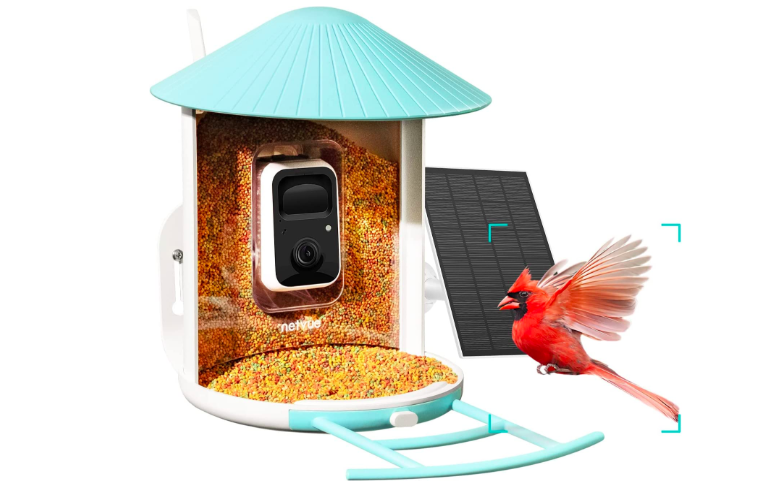
Technology sure is fun. There are several “smart” bird feeders on the market now that allow you to have bird feeder video/photos sent straight to your smartphone as soon as they arrive. Some can also identify the birds visiting through imaging or audio. Pretty neat!
I don’t personally have one of these feeders. They’re expensive, and I don’t want to risk leaving one out in my communal apartment space. However, I’ve heard they’re a ton of fun. I can see them being especially interesting as you travel. You can continue to monitor your birds from the camera via your smartphone no matter where you are.
The most popular product I’ve heard of and seen on the market lately is the Bird Buddy feeder.
There are also a couple of options on Amazon that I found:
NETVUE Birdfy Lite- Smart Bird Feeder Camera with Solar Pannel
6. (Bonus Tip) Clean Your Feeders when you Return
When you come home, your feeders might be empty or close to it. Now is a great time to clean and refill your feeders! The Cornell Bird Lab recommends you clean your feeder every two weeks to prevent disease from spreading). Here are the quick steps:
1. Take your bird feeders apart
2. Scrub them out with hot water and dish soap
3. Rinse thoroughly
4. Soak your feeder in a 9 part water, one part bleach solution (for wooden feeders: use vinegar instead of beach)
5. Rinse thoroughly again
6. Allow the feeder to air dry
From buying a larger bird feeder to investing in a seed cylinders, there are many simple tips you can follow when it comes to feeding birds while away from home. By following these tips, you can be assured that your feathered friends will be taken care of and will stick around during your vacation.

Pingback:How to Attract Indigo Buntings to Your Yard - BIRD BITES
Pingback:Why Aren’t Birds Coming to My Feeder? 6 Reasons and How to Fix - BIRD BITES
Pingback:The Most Common Bird Feeding Mistakes Beginners Make and How to Avoid Them - BIRD BITES
Pingback:9 Birds You Can See at the Fairmont Orchid in Hawaii (Photos) - BIRD BITES